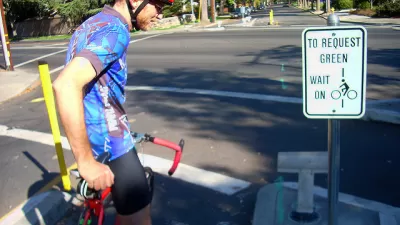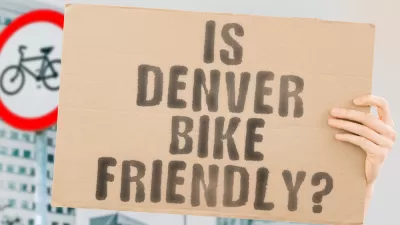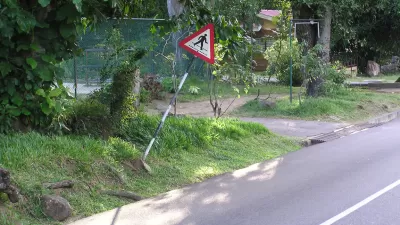NPR's Scott Simon, Peabody-winning journalist and the Saturday host of Morning Edition, recently set off a Twitter-storm when he called out bikers as scofflaws.

Simon's tweet is what's known as a "fundamental attribution error," defined by Wikipedia as the "tendency to place an undue emphasis on internal characteristics to explain someone else's behavior in a given situation, rather than considering external factors."

The tweet also inspired a number of responses that reveal a lot of useful thinking about the position of biking among the culture and infrastructure of the country.
Ashley Hasley, transportation reporter for the Washington Post, points out the disparity in reactions to reportage on the deadliness of driving: "When I write about drunk driving (cause of 10,322 road deaths in 2012), or speeding (9,320 deaths) or distracted driving (3,328 deaths) — a total of 23,070 fatalities caused by driver error — the stories get little or no reader response. Rarely a peep, if that, from anyone….But virtually any story about people who ride bicycles gets an almost immediate flood of responses like this one last week: 'I have NEVER seen a bicycle stop at a red light or obey any traffic law of any kind.'"
Carl Alviani, writing for Medium, includes that point and many others in a longer read. Here's a sample of the many points Alviani makes in response to the controversy, and what it signifies in the "bikes versus everyone" debate:
"Now, there’s nothing unusual about this kind of bikers vs everyone drama, especially on the Internet: browse the comments section beneath a bike-related article on almost any broad-reaching publication, and you’ll find that few topics besides Israel, healthcare and gun control stir up as much debate."
"In each of these cases, a thoughtful, intelligent observer is prodded by a mix of fear and anger to give an alarming anecdote more weight than an abundance of evidence, or even common sense. On a street carrying thousands of 3000 pound vehicles a day at 40mph or more, we focus our fears on the handful of 30 pound vehicles moving half that fast."
"The likely conclusion is that people riding bikes don’t break more laws or fewer laws than when they drive cars, but they do break different laws. Given that most cyclists are also drivers, it’s reasonable to think the levels of lawlessness would be consistent."
FULL STORY: Why Bikes Make Smart People Say Dumb Things

Planetizen Federal Action Tracker
A weekly monitor of how Trump’s orders and actions are impacting planners and planning in America.

Maui's Vacation Rental Debate Turns Ugly
Verbal attacks, misinformation campaigns and fistfights plague a high-stakes debate to convert thousands of vacation rentals into long-term housing.

San Francisco Suspends Traffic Calming Amidst Record Deaths
Citing “a challenging fiscal landscape,” the city will cease the program on the heels of 42 traffic deaths, including 24 pedestrians.

Defunct Pittsburgh Power Plant to Become Residential Tower
A decommissioned steam heat plant will be redeveloped into almost 100 affordable housing units.

Trump Prompts Restructuring of Transportation Research Board in “Unprecedented Overreach”
The TRB has eliminated more than half of its committees including those focused on climate, equity, and cities.

Amtrak Rolls Out New Orleans to Alabama “Mardi Gras” Train
The new service will operate morning and evening departures between Mobile and New Orleans.
Urban Design for Planners 1: Software Tools
This six-course series explores essential urban design concepts using open source software and equips planners with the tools they need to participate fully in the urban design process.
Planning for Universal Design
Learn the tools for implementing Universal Design in planning regulations.
Heyer Gruel & Associates PA
JM Goldson LLC
Custer County Colorado
City of Camden Redevelopment Agency
City of Astoria
Transportation Research & Education Center (TREC) at Portland State University
Jefferson Parish Government
Camden Redevelopment Agency
City of Claremont





























